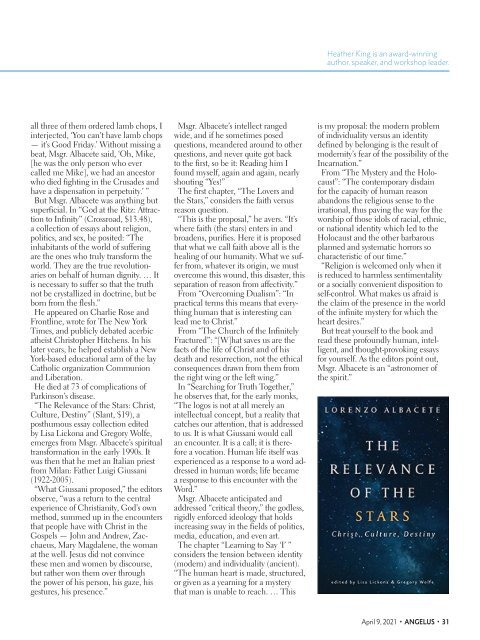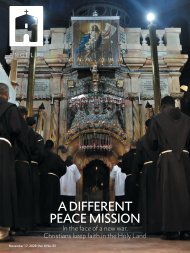Angelus News | April 9, 2021 Vol 6 No 7
Nineteenth-century sculptor Philippe Lemaire’s relief sculpture of the risen Christ on the exterior of St. Isaac’s Cathedral in St. Petersburg, Russia. For this year’s special Easter issue, on Page 10 Kathryn Lopez offers a meditation on where Easter finds Catholics after a long year of fear. On Page 26, Greg Erlandson reflects on the recent shootings in Georgia and the scandal of God’s forgiveness for the worst of sinners. And on Page 28, Angelus talks to Catholic filmmaker Roma Downey about her perfectly timed new film, “Resurrection.”
Nineteenth-century sculptor Philippe Lemaire’s relief
sculpture of the risen Christ on the exterior of St. Isaac’s
Cathedral in St. Petersburg, Russia. For this year’s special
Easter issue, on Page 10 Kathryn Lopez offers a meditation on where Easter finds Catholics after a long year of fear. On Page 26, Greg Erlandson reflects on the recent shootings in Georgia and the scandal of God’s forgiveness for the worst of sinners. And on Page 28, Angelus talks to Catholic filmmaker Roma Downey about her perfectly timed new film, “Resurrection.”
- TAGS
- resurrection
- pope
- easter
- catholic
You also want an ePaper? Increase the reach of your titles
YUMPU automatically turns print PDFs into web optimized ePapers that Google loves.
Heather King is an award-winning<br />
author, speaker, and workshop leader.<br />
all three of them ordered lamb chops, I<br />
interjected, ‘You can’t have lamb chops<br />
— it’s Good Friday.’ Without missing a<br />
beat, Msgr. Albacete said, ‘Oh, Mike,<br />
[he was the only person who ever<br />
called me Mike], we had an ancestor<br />
who died fighting in the Crusades and<br />
have a dispensation in perpetuity.’ ”<br />
But Msgr. Albacete was anything but<br />
superficial. In “God at the Ritz: Attraction<br />
to Infinity” (Crossroad, $13.48),<br />
a collection of essays about religion,<br />
politics, and sex, he posited: “The<br />
inhabitants of the world of suffering<br />
are the ones who truly transform the<br />
world. They are the true revolutionaries<br />
on behalf of human dignity. … It<br />
is necessary to suffer so that the truth<br />
not be crystallized in doctrine, but be<br />
born from the flesh.”<br />
He appeared on Charlie Rose and<br />
Frontline, wrote for The New York<br />
Times, and publicly debated acerbic<br />
atheist Christopher Hitchens. In his<br />
later years, he helped establish a New<br />
York-based educational arm of the lay<br />
Catholic organization Communion<br />
and Liberation.<br />
He died at 73 of complications of<br />
Parkinson’s disease.<br />
“The Relevance of the Stars: Christ,<br />
Culture, Destiny” (Slant, $19), a<br />
posthumous essay collection edited<br />
by Lisa Lickona and Gregory Wolfe,<br />
emerges from Msgr. Albacete’s spiritual<br />
transformation in the early 1990s. It<br />
was then that he met an Italian priest<br />
from Milan: Father Luigi Giussani<br />
(1922-2005).<br />
“What Giussani proposed,” the editors<br />
observe, “was a return to the central<br />
experience of Christianity, God’s own<br />
method, summed up in the encounters<br />
that people have with Christ in the<br />
Gospels — John and Andrew, Zacchaeus,<br />
Mary Magdalene, the woman<br />
at the well. Jesus did not convince<br />
these men and women by discourse,<br />
but rather won them over through<br />
the power of his person, his gaze, his<br />
gestures, his presence.”<br />
Msgr. Albacete’s intellect ranged<br />
wide, and if he sometimes posed<br />
questions, meandered around to other<br />
questions, and never quite got back<br />
to the first, so be it: Reading him I<br />
found myself, again and again, nearly<br />
shouting “Yes!”<br />
The first chapter, “The Lovers and<br />
the Stars,” considers the faith versus<br />
reason question.<br />
“This is the proposal,” he avers. “It’s<br />
where faith (the stars) enters in and<br />
broadens, purifies. Here it is proposed<br />
that what we call faith above all is the<br />
healing of our humanity. What we suffer<br />
from, whatever its origin, we must<br />
overcome this wound, this disaster, this<br />
separation of reason from affectivity.”<br />
From “Overcoming Dualism”: “In<br />
practical terms this means that everything<br />
human that is interesting can<br />
lead me to Christ.”<br />
From “The Church of the Infinitely<br />
Fractured”: “[W]hat saves us are the<br />
facts of the life of Christ and of his<br />
death and resurrection, not the ethical<br />
consequences drawn from them from<br />
the right wing or the left wing.”<br />
In “Searching for Truth Together,”<br />
he observes that, for the early monks,<br />
“The logos is not at all merely an<br />
intellectual concept, but a reality that<br />
catches our attention, that is addressed<br />
to us. It is what Giussani would call<br />
an encounter. It is a call; it is therefore<br />
a vocation. Human life itself was<br />
experienced as a response to a word addressed<br />
in human words; life became<br />
a response to this encounter with the<br />
Word.”<br />
Msgr. Albacete anticipated and<br />
addressed “critical theory,” the godless,<br />
rigidly enforced ideology that holds<br />
increasing sway in the fields of politics,<br />
media, education, and even art.<br />
The chapter “Learning to Say ‘I’ ”<br />
considers the tension between identity<br />
(modern) and individuality (ancient).<br />
“The human heart is made, structured,<br />
or given as a yearning for a mystery<br />
that man is unable to reach. … This<br />
is my proposal: the modern problem<br />
of individuality versus an identity<br />
defined by belonging is the result of<br />
modernity’s fear of the possibility of the<br />
Incarnation.”<br />
From “The Mystery and the Holocaust”:<br />
“The contemporary disdain<br />
for the capacity of human reason<br />
abandons the religious sense to the<br />
irrational, thus paving the way for the<br />
worship of those idols of racial, ethnic,<br />
or national identity which led to the<br />
Holocaust and the other barbarous<br />
planned and systematic horrors so<br />
characteristic of our time.”<br />
“Religion is welcomed only when it<br />
is reduced to harmless sentimentality<br />
or a socially convenient disposition to<br />
self-control. What makes us afraid is<br />
the claim of the presence in the world<br />
of the infinite mystery for which the<br />
heart desires.”<br />
But treat yourself to the book and<br />
read these profoundly human, intelligent,<br />
and thought-provoking essays<br />
for yourself. As the editors point out,<br />
Msgr. Albacete is an “astronomer of<br />
the spirit.”<br />
<strong>April</strong> 9, <strong>2021</strong> • ANGELUS • 31


















